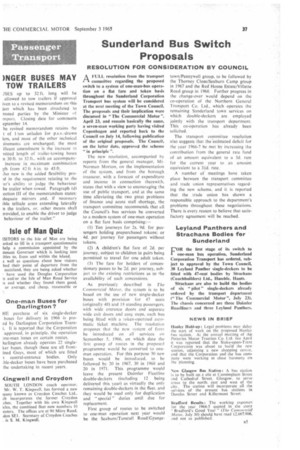Sunderland Bus Switch Proposals
Page 39

If you've noticed an error in this article please click here to report it so we can fix it.
RESOLUTION FOR CONSIDERATION BY COUNCIL I-1 A FULL resolution from the transport
committee regarding the proposed switch to a system of one-man-bus opera. tion on a flat fare and token basis throughout the Sunderland Corporation Transport bus system will be considered at the next meeting of the Town Council. The proposals and their implication were discussed in "The Commercial Motor ". April 23, and remain basically the same, a seven-man working party having visited Copenhagen and reported back to the Council on July 14, following publication of the original proposals. The Council, on the latter dale, approved the scheme "in principle".
The new resolution, accompanied by reports from the general manager, Mr. Norman Morton, on the implementation of the system, and from the borough treasurer, with a forecast of expenditure and income in connection therewith, states that with a view to encouraging the use of public transport, and at the same time alleviating the two great problems of finance and acute staff shortage, the transport committee recommends that all the Council's bus services be converted to a modern system of one-man operation on a flat fare basis comprising:—
(1) Ten journeys for 2s. 9d. for passengers holding prepurchased tokens; or 4d. per journey for passengers without tokens.
(2) A children's flat fare of 2d, per journey, subject to children in pairs being permitted to travel for one adult token.
(3) The fare for holders of concessionary passes to be 2d. per journey, subject to the existing restrictions as to the availability of such concessions.
As previously described in The Commercial Motor, the system is to be based on the use of new single-decker buses with provision for 47 seats (originally 48) and 18 standing passengers. with wide entrance doors and separate wide exit doors and easy steps, each bus being fitted with a token-operated automatic ticket machine. The resolution proposes that the new system of fares be introduced on all services on September 5., 1966. on which date the first group of routes in the proposed programme would be converted to oneman operation. For this purpose 30 new buses would be introduced, to be followed by 20 in 1967. 30 in 1968 and 20 in 1971. This programme would leave the present Daimler Fleetline double-deckers (including 12 being delivered this year) as virtually the only remaining double-deckers in the fleet, and they would be used only for duplication and "special" duties until due for replacement.
First group of routes to be switched to one-man operation next year would be the Seaburn/Tunstall Road/Grange
town/Pennywell group, to be followed by the Thorney CloseiSeaburn Camp group in 1967 and the Red House Estate/Villette Road group in 1968. Further progress in the change-over would depend on the co-operation of the Northern General Transport Co. Ltd., which operates the remaining Sunderland town services on which double-deckers are employed jointly with the transport department. This co-operation has already been solicited.
The transport committee resolution also suggests that the 'estimated deficit for the year 1966-7 be met by increasing the contribution from the general rate fund of an amount equivalent to a 3d. rate for the current year to an amount equivalent to a rate.
A number of meetings have taken place between the transport committee and trade union representatives regarding the new scheme, and it is reported that the trade union has shown a responsible approach to the department's problems throughout these negotiations. There is every.reagon to believe that satisfactory agreement will be reached.




























































































































































